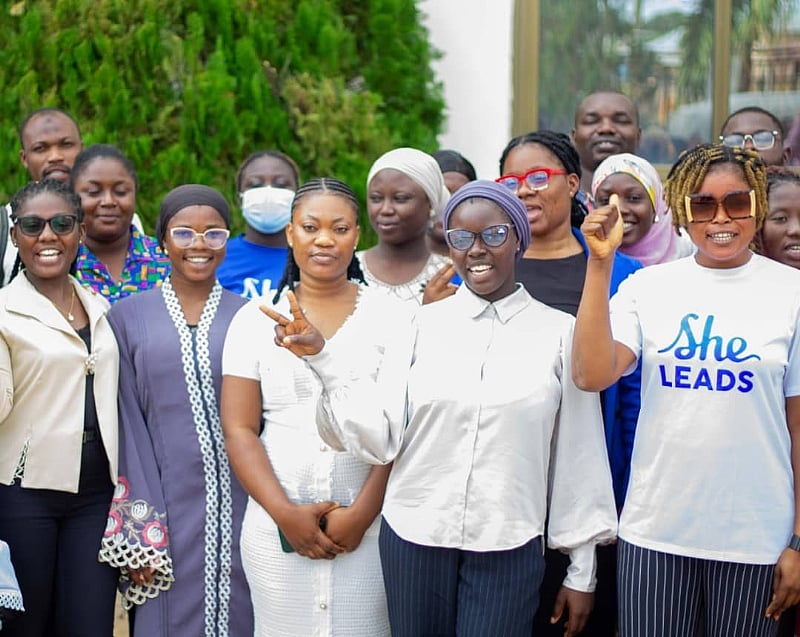Community Aid for Rural Development (CARD Ghana) orchestrated a pivotal capacity-building training session for networks of women and youth-led associations in the Upper West Region of Ghana. This initiative, falling under the umbrella of the She Leads Project supported by Plan International Ghana, sought to empower these groups with a deeper understanding of local governance structures and processes. The training, held on June 14, 2025, served as a crucial step towards strengthening the She Leads Social Movement, a platform dedicated to amplifying the voices and influence of girls and young women in decision-making processes while also challenging ingrained gender norms within both formal and informal institutions. The training aimed to equip participants with the knowledge and skills necessary to effectively engage with local governance structures and advocate for their rights and interests.
Felicia Baganiah, President of the She Leads Social Movement in the region, underscored the timeliness and strategic significance of the training, emphasizing its potential to bolster their advocacy efforts. She highlighted a prevalent knowledge gap among members regarding engagement with duty-bearers, often leading to the bypassing of crucial grassroots structures like unit committees and assembly members. The training addressed this gap by elucidating the key actors and channels for effective engagement, starting from the grassroots level and extending up to higher authorities. Baganiah also stressed the inclusive nature of the She Leads Social Movement, emphasizing its collaborative approach with diverse stakeholders, including youth associations, civil society organizations, and individuals aligned with their advocacy goals. Looking towards the future, the movement plans to actively engage boys in discussions on sensitive topics such as menstrual health and teenage pregnancy, fostering a sense of shared responsibility.
Abubakar Nii Adjetey Siddiqi, Wa Municipal Statistician, provided participants with a comprehensive overview of Ghana’s decentralized local governance system. He meticulously explained how young people, particularly girls, could leverage various structures, from unit committees to district assemblies, to seek redress and actively participate in decision-making processes. Siddiqi emphasized the critical importance of understanding the intricacies of the system to ensure targeted and impactful advocacy. By equipping participants with this knowledge, the training aimed to empower them to navigate the complexities of local governance effectively.
James Baba Anabiga, Speaker of the Upper West Regional Youth Parliament, defined advocacy as “an intentional series of steps taken to influence policy,” highlighting its central role in advancing the interests of young people, especially girls. He outlined a range of effective advocacy strategies, encompassing lobbying, media engagement, social media utilization, petitions, and, in extreme cases, demonstrations or legal action. Anabiga particularly lauded the power of the media, citing it as a vital ally that has contributed significantly to the success of numerous advocacy campaigns undertaken by the Youth Parliament. His presentation provided participants with a practical toolkit for effective advocacy.
Lawyer Alhassan Ziyad Hudi, a legal practitioner, delved into the legal underpinnings of inclusion and participation, highlighting the recently passed Affirmative Action Law as a landmark achievement in the pursuit of gender equality in governance. While acknowledging the passage of this law, he emphasized the need for its operationalization through the establishment of a gender equality committee and the development of a legislative instrument to fully implement its provisions. Hudi pointed out that local governance structures are inherently designed to promote inclusivity, including the participation of women and girls. However, he cautioned against tokenism – the practice of including women in decision-making spaces without granting them genuine power – which he identified as a persistent challenge. He advocated for continuous capacity-building initiatives to empower girls and women to understand their rights and effectively exercise their influence within the system.
The training resonated deeply with participants, who described it as insightful and empowering. Fauzia Zila Seidu, a member of the She Leads Movement, expressed that the detailed explanation of decentralization structures and advocacy strategies represented a turning point not only for her but also for many other participants who were previously unaware of the role of unit committees or how to effectively engage in lobbying. Yahaya Hidahiatu, another participant, echoed this sentiment, emphasizing the educational and empowering nature of the session, while also highlighting the enjoyable and networking aspects of the training. Ahmed Salifu, Regional President of the Fulbe Youth Association of Ghana (FUYAG), affirmed that the training had equipped him and his fellow participants with the knowledge and tools necessary for meaningful engagement in advocacy, starting at the grassroots level. The positive feedback from participants underscores the training’s success in empowering them to become active agents of change within their communities.


